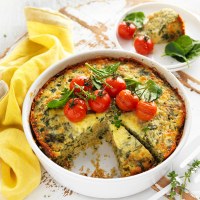The essential nutrient in eggs
What are the health benefits of eggs?
It's generally believed that eggs are the original superfood because of their many health benefits. Eggs provide good protein (especially in the egg white), vitamins, minerals, omega-3 fatty acids and antioxidants. Wow! No wonder they're considered a superfood. Here's a run down of what's contained in that shell:
- Nutrient rich – 40% of daily vitamin D requirements, 25% of daily folate, 12% of daily riboflavin (Vitamin B2), 20% of daily selenium. Plus eggs contain all important choline. More on that later.
- High-quality protein – one egg contains about 6.3g of protein. This helps build, strengthen and repair or replace things such as tissue. The protein in eggs contains all nine essential amino acids needed by the body for optimum growth and maintenance.
- Raise levels of good cholesterol – Eggs help increase levels of high-density lipoprotein (HDL), or good cholesterol. Higher levels of HDL can help reduce the risk of heart disease.
- Good source of omega-3s – Eggs contains similar types of omega-3s as those found in fish. Which makes eggs useful for people who avoid or can't eat fish. Omega-3 fats are good for things such as heart and brain health, and also help to protect eyes.
- Eggs are filling – because eggs are nutrient dense with high-quality protein, they are one of the healthiest food for weight management. They can increase levels of a hormone that helps you feel satisfied after eating as well as delay the rate at which food leaves the stomach. It's the high-satiety levels of eggs that leads to greater feelings of satisfaction, less hunger and a reduce desire to eat later in the day.
What are the benefits of choline in eggs?
It's so important for our health and it's an essential nutrient in eggs, but many people don't know what choline is. Results from studies are increasing our awareness and understanding of choline every day. With eggs providing some of the highest quantities of choline of any food, Australian Eggs has delved into what exactly choline is, how it benefits our bodies and where you can find this important micronutrient in your daily diet.
What is choline? Choline is a nutrient made in the liver, however most people don't produce enough to meet daily requirements. This means choline also needs to provided by the foods we eat. It is essential for human health and is similar in function to B vitamins. Research suggests that choline plats an important role in brain and spinal cord development during pregnancy, cognitive development in infants and may also help prevent cognitive decline in the elderly.
Choline and pregnancy - Because if it's beneficial role in developing a healthy brain and nervous system functions, choline is particularly important during pregnancy and breastfeeding. Choline also plays a role in reducing the risk of certain birth defects, as well as supporting foetal cognitive and spinal cord development.
Benefits of choline - It is an essential nutrient for the following reasons:
- helps create fats that support the integrity of cell membranes and contributes to strong cell membranes.
- can help to create a substance that is essential for removing cholesterol from liver and sending it into the bloodstream to use for energy.
- contributes to methylation, a metabolic process that helps your body repair and produce DNA.
- helps produce acetylcholine, which is an important neurotransmitter that is needed for muscle control, memory, focus and heartbeat regulation, amongst other basic functions.
Do eggs have choline? Eggs are the most common source of choline in the Australian diet, providing more than double the amount of choline per 100g than any other commonly eaten food. One large hard-boiled egg contains 164mg of choline. This provides about 30-36% of your daily requirement. This is present only in the egg yolk. The egg white does not contain choline.
Other foods that contain choline - This nutrient can also be found in foods such as beef or chicken liver, fish, cauliflower, broccoli, brussels sprouts, cabbage, peas, tofu, quinoa and carrots.
GET THE RECIPE: How to fry an egg by Australian Eggs
One of the quickest ways to get all the wonderful health benefits in eggs is to fry it. Frying an egg doesn't mean that it's not a healthy way to cook eggs. With this easy and tried and tested method for frying an egg, only 2 tsp of olive oil is used to cook the egg. The results speak for themselves as the video shows. Here you'll learn how to fry eggs sunny side up and over easy.
GET THE RECIPE: Perfectly Poached Eggs by Australian Eggs
A perfectly poached egg is a thing of beauty. That gorgeous bright orange yolk drizzling down as you cut into it. With this video, you can follow 3 different methods for how to cook perfectly poached eggs in the oven and on the stovetop.
GET THE RECIPE: Easy Boiled Eggs by Australian Eggs
Learn how to cook perfect hard boiled eggs, medium boiled eggs and soft boiled eggs with this handy guide. Add boiled eggs to easy breakfast recipes, in salads and rolls, just right for devilled eggs or serve a soft boiled egg with toast soldiers for that timeless classic.














